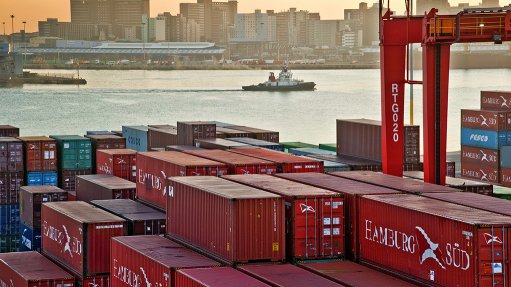
The Durban port
Loadshedding, challenges at the ports and political uncertainty saw manufacturer confidence in the first quarter of the year dip five points to 21, Absa's latest Manufacturing Survey shows.
The 21 index points were significantly lower than the long-term average of 37 points.
Seasonally, the first quarter is typically a quieter period for the manufacturing sector. This trend continued, with domestic sales falling by nine points and export sales falling by 17 points, says Absa Relationship Banking manufacturing sector head Justin Schmidt.
“Confidence has still not returned to pre-pandemic levels. Manufacturing plays a pivotal role in the growth of the South African economy. However, with multiple factors impacting sentiment, the sector continues its stop-start recovery and it is no surprise that manufacturers are feeling downbeat,” he adds.
Relative to planned production and expected demand, current raw material dropped back into negative terrain at 20 points below the long-term average and finished goods also dropped back into negative terrain at 14 points below the long-term average.
“Additionally, a 22-point drop in seasonally adjusted production further highlights the knock-on impact of supply chain challenges,” he notes.
Further, constrained business conditions amplified by weaker consumer demand is fuelling manufacturers’ pessimistic outlook regarding expected business conditions for the next 12 months.
Against this background, manufacturers are cautious to invest. Fixed investment remained in negative terrain for the fifth quarter in a row, he points out.
“While manufacturers have seen the benefit of investing in their own energy generation, the majority of manufacturers seem to be holding off on non-energy investments,” Schmidt says.
Additionally, across the investment categories of land, buildings, inventory, additions and replacements, the majority of manufacturers indicated reduced investment intentions over the next 12 months.
“In today's rapidly evolving landscape, manufacturing stands at the forefront of innovation, driving progress and shaping the future of industries worldwide.
“Manufacturers need to ensure the strategic allocation of capital and resources to keep up with technological advancements and build resilience,” Schmidt emphasises.